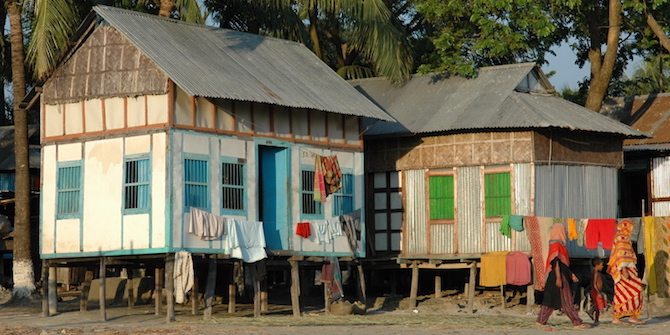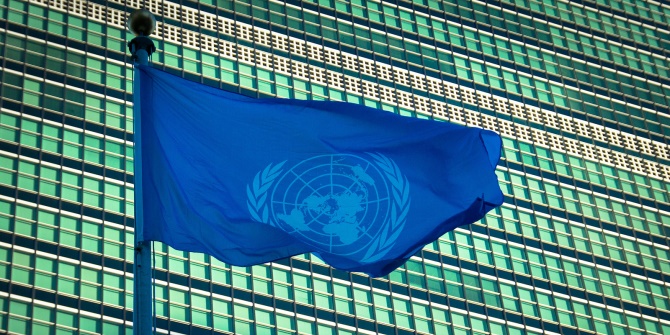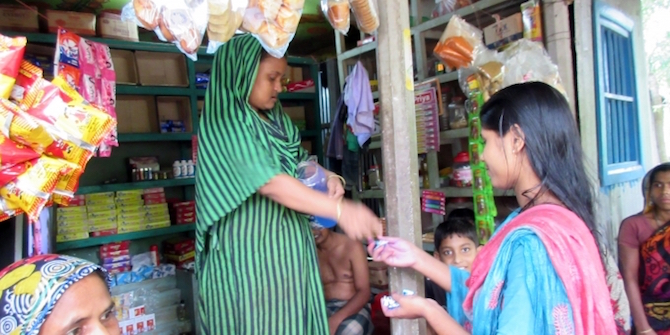In the second part of this blog, Dr Kalpana Wilson explores the connections between the activities of Hindu supremacist groups in Britain, particular forms of development taking place in India, and dominant currents of British racism. Click here for Part 1, which argues that growing interest in the role of diasporas in development is related to specific strategies of capital and the consolidation of neoliberal policies.
The Sangh Parivar, the umbrella organisation of far-right Hindu supremacist groups in India, has actively targeted the Indian diaspora in the UK from the 1980s onwards , and now draws upon it extensively for moral and, more importantly, material support for its project of establishing India as a Hindu rashtra or state. By setting up groups claiming to represent Hindu ‘faith communities’, the Sangh Parivar in Britain has also accessed government funding. Pro-Hindutva groups in Britain also forged strong links with both the Labour Party and the Conservative Party. For example, in 2001, Labour MP for Brent North Barry Gardiner of the Labour Friends of India visited Gujarat where he personally presented Bharatiya Janata Party (BJP) Chief Minister Narendra Modi with a cheque for one million pounds collected in Britain by the charity Sewa International for earthquake relief.
Within the discourses of Hindutva, Muslims, and Muslim men in particular, are identified as the primary threat to the nation, and made to symbolically represent a series of interlinked tropes including terrorism, fanaticism, allegiance to forces external and hostile to the nation, illegal immigration, population growth, and women’s subordination. Indian ‘national interests’ within these hyper-nationalist discourses revolve around the perceived threat from Pakistan and focus on Kashmir, and the bodies of Kashmiris, as the territory over which Indian ‘integrity’ must be violently reproduced. Clearly, this has multiple intersections with the post-Cold War shift which identified Islam as the new enemy of ‘Western civilisation’ and, post-9/11, the US-led ‘War on Terror’; the anti-Muslim racism which has become central following realignments in the dominant discourses of British racism; and the changes in the British state’s approaches to ‘race’ which underpinned the emergence of the ‘Community Cohesion’ agenda.
This convergence was evident in February 2007 when Ramesh Kallidai and the Hindu Forum of Britain (of which Hindu Aid is an offshoot) made allegations of ‘forced conversions’ of ‘hundreds’ of ‘Hindu and Sikh girls’ by ‘Muslim extremists’ at British universities. The allegation of forced conversions of young women is part of an arsenal of myths propagated by the Hindu right in India to incite violence against minority communities: inflammatory leaflets making these claims were in circulation immediately before the massacres of Muslims in Gujarat in 2002. In fact the notion of Hindu women needing protection from predatory Muslim men informs the core patriarchal-nationalist narrative of Hindutva, which appeals to Hindu men to reassert their masculinity through the performance of sexual and other forms of extreme violence against minority groups. In this case, however, Metropolitan Police Commissioner Ian Blair, who was a guest at the conference where the claims were made, seized the opportunity to commit his force to action, despite the absence of any evidence for such ‘conversions’. Blair’s remarks were duly reported widely in the media. Yet a few months later, the police were reportedly unable to cite a single such case.
But the symbiotic relationship between Hindu supremacist ideology in Britain and the dominant currents of British racism represents more than simply a coincidental overlapping of demonisations or even a conjunctural convergence of different actors’ political goals. To understand this, we need to look at processes of globalisation, development and imperialism, and how both twenty-first century British racism and contemporary Hindutva are shaped by, and in turn impact upon, these processes. The emergence of Hindutva forces as an effective political force in India from the beginning of the 1990s has been inextricably related to the restructuring of capital in the era of neoliberal globalisation and the Indian state’s embrace of policies of economic liberalisation.
It is in Gujarat, which has been ruled by the BJP with Narendra Modi as chief minister since 2001, that the connections between the ideology of Hindutva and corporate capital are perhaps most evident. The Gujarat genocide of 2002 has not stood in the way of Modi’s self-projection as ‘Vikas-Purush’ (Man of Development). The development policies pursued, in which swathes of land and coastline have been converted into Special Economic Zones (and latterly ‘Special Investment Regions’) and handed over to corporates heavily subsidised by the state have meant that high levels of growth in relation to the rest of India have been accompanied by nutrition poverty levels higher than all-India levels; according to the recent “India Chronic Poverty Report”, Gujarat is currently one of the states with the highest incidence of child malnutrition among the poor. It has also seen severe curtailment of labour rights, all under the shadow of the continuing activities of Hindu supremacist organisations, as a result of which many Muslim families driven from their homes in 2002 remain in camps unable to return safely.
As a result of this development model, while the BJP is often still viewed as the party of small-scale domestic business and trade due to its core vote base, it is now the ruling party of choice for large sections of Indian and transnational corporate capital. With ongoing indictments against him for the 2002 genocide, Narendra Modi has been endorsed as the best person to be the next prime minister by India’s leading corporate billionaires including Ratan Tata, Mukesh Ambani, and Sunil Mittal, the latter claiming that ‘CEO’ Modi “can also run the nation”. Tellingly, these statements were made at the 2009 Vibrant Gujarat Global Investor Summit. Another guest was British MP Barry Gardiner, of the pro-Sangh ParivarLabour Friends of India, who went a step further to proclaim, “Gujarat can lead the world”. Most recently, David Cameron’s Foreign Office took unprecedented steps to ‘rehabilitate’ Modi by sending the British High Commissioner to Ahmedabad to meet him to ‘explore opportunities for closer cooperation’.
Gujarat has a particular salience in the context of the diaspora in Britain. This is partly because of personal connections with the state: most people of Indian origin who identify as Hindu in Britain are from families which originated in Gujarat and often still have relatives there, although many of these families migrated to Britain via East Africa. It is also because of the symbolic role the state has come to play within certain discourses as the epitome of a ‘modern’, developed, and successful India, a construction in which dominant sections of Indian diasporic communities in Britain are arguably particularly invested. This is conceived in specifically neoliberal terms in which growing inequality is irrelevant, and persistent poverty invisible. The last decade has seen both the naturalisation of this approach to development with mainstream political parties in India all adopting it, as well as the institutional entrenchment of Hindutva-inspired notions of citizenship, something which is much more tenacious than the fluctuating electoral fortunes of the BJP and its allies.
DfID’s partnership with Hindu supremacist groups in the context of initiatives to involve black and ethnic minority communities in development is thus consistent with the reconfiguration of the British state’s approach to ‘race’ in the context of global changes in the 1990s and the War on Terror from 2001 onwards. At the same time, it is premised on a shared, neoliberal understanding of ‘development’, which involves facilitating the appropriation of land, resources, and labour by corporate capital. This approach to development has been vigorously promoted in India by DfID.
Meanwhile, the fact that Indian capital is playing an increasingly central role in the crisis-ridden British economy has only reinforced new representations of India as unproblematically affluent and ‘civilised’ and of its diaspora as loyal and deserving British citizens. The extent to which ‘Hinduism’ in the racialised discourse of British citizenship has come to be associated with an assumed allegiance to the ongoing British imperialist project was demonstrated in October 2011 when Prime Minister David Cameron spoke at a reception for ‘prominent members of the Sikh and Hindu communities’ hosted at 10 Downing Street to celebrate Diwali. In his first public comments on the lynching of Colonel Gaddafi by NATO backed forces in Libya earlier that day, Cameron enthused that “Diwali being the festival of a triumph of good over evil and also the death of a devil, perhaps there is a little resonance in what I am saying tonight”.
However, these racialised representations overlap and co-exist with, rather than completely displacing, the representations of ‘Asians’ and India which existed earlier. They do not preclude the continuing reproduction, for example, of racist media representations of India and Indians as pathologically and comically ‘unhygienic’ or ‘ignorant’. Nor of course do they offer any protection for people of Indian origin in Britain, like Indian student Anuj Bidve who was shot dead in Salford on Boxing Day 2011. Equally, just as both the violence of the Hindu far-right and the depredations of corporate capital have been continually resisted in multiple ways in India, in Britain the activities of the Sangh Parivar described earlier have faced sustained opposition and protest by people of South Asian origin organising across boundaries, and contesting the British state’s constructions of ‘race’ and ‘community’.
Dr Kalpana Wilson is the LSE Fellow in Gender Theory, Globalisation and Development at the Gender Institute.









4 Comments